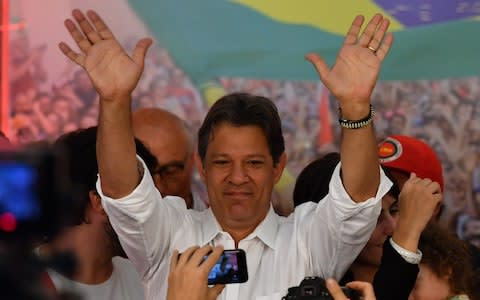Brazil's far-Right candidate Jair Bolsonaro sweeps to election victory

Former Army captain Jair Bolsonaro won Brazil's presidential election on Sunday night, riding a wave of frustration over corruption and crime that brought a dramatic swing to the right in the world's fourth-largest democracy.
With 94 percent of the ballots counted, Mr Bolsonaro had 56 percent of the votes in the run-off election against left-wing hopeful Fernando Haddad of the Workers Party (PT), who had 44 percent, according to the electoral authority TSE.
In Rio de Janeiro, Mr Bolsonaro's supporters set off fireworks on Copacabana Beach. In Sao Paulo, Brazil's largest city, cars horns could be heard honking and crowds celebrated as the results came in. There were also reports of clashes between his backers and opponents on Avenida Paulista in Sao Paulo.
"I first want to thank God," Mr Bolsonaro told supporters in a video transmitted from his home in Rio, recounting how he was stabbed while campaigning last month and almost died.

Donald Trump was among world leaders to congratulate Mr Bolsonaro on his victory. He tweeted on Monday: "Had a very good conversation with the newly elected President of Brazil, Jair Bolsonaro, who won his race by a substantial margin. We agreed that Brazil and the United States will work closely together on Trade, Military and everything else! Excellent call, wished him congrats!"
Mr Bolsonaro, who ran on promises to clean up Brazil and bring back "traditional values," said he would respect the constitution and personal liberty, vowing to "change Brazil's destiny together". He said that wasn't just the words of a man but a promise to God.
He went into Sunday the clear front-runner after getting 46 percent of the vote to Mr Haddad's 29 percent in the first round of the election earlier this month, which had 13 contenders.
Mr Bolsonaro's sudden rise was propelled by rejection of the leftist Workers Party (PT) that ran Brazil for 13 of the last 15 years and was ousted two years ago in the midst of the country's worst recession and biggest-ever political graft scandal.
Mr Bolsonaro vowed to "change Brazil's destiny together". During his victory speech he pledged to govern "following the Bible and the constitution," and said "we cannot continue flirting with socialism, with communism, populism and the extremism of the left."

Mr Haddad, standing in for the jailed PT founder and former Brazilian president Luiz Inacio Lula da Silva, had been trailing Mr Bolsonaro since the first-round vote three weeks ago.
"I want to take the PT out," said Celina Ceccon, who previously supported Lula and his successor Dilma Rousseff but voted for Mr Bolsonaro in this election
"There was a lot of corruption, bad things, so much stealing. There's got to be a change," said the 74-year-old resident of the capital Brasilia.

Many Brazilians are concerned that Mr Bolsonaro, an admirer of Brazil's 1964-1985 military dictatorship and a defender of its use of torture on leftist opponents, will trample on human rights, curtail civil liberties and muzzle freedom of speech.
The 63-year-old seven-term congressman has vowed to crack down on crime in Brazil's cities and farm belt by granting police more autonomy to shoot at armed criminals. He also wants to let more Brazilians buy weapons to fight crime - a major demand by one of his biggest backers, the powerful farm lobby.

